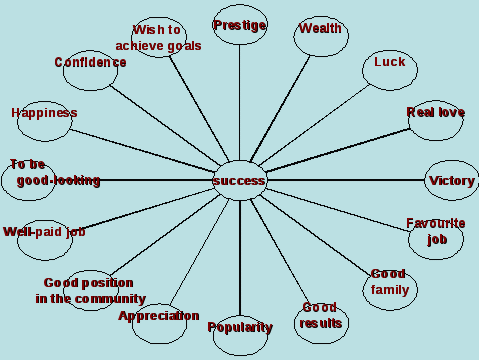- Учителю
- Урок английского языка для 9 класса по теме «Легко ли стать успешным?»
Урок английского языка для 9 класса по теме «Легко ли стать успешным?»
МБОУ Усть-Абаканская СОШ
Урок в 9 классе.
Тема
«Легко ли стать успешным?».
Учебно-методический комплекс
"Enjoy English", 9 класс,
М.З. Биболетова,
учитель английского языка
Шихова Г. М.
Усть-Абакан, 2013
Objectives.
Ss will:
-
be able to think critically about life values and ways of achieving goals successfully;
-
be able to speak about their goals in life and personal qualities needed to achieve these goals.
Skills development:
-
practise making notes;
-
speak about characteristics for successful people;
-
practise reporting the results of a discussion;
-
express opinions about goals and options.
I.Warming up.Аудирование рассказа о знаменитых людях.
(Multymedia begins to function)
Life is that we do with it. It's the Lord who told that every person on the Earth has one's own burden! These people have made the gratest choice in their lives: doing nothing, going forward or simply living day by day.
Most of these people succeeded starting without any money or social position. Many of them didn't know if they would be appreciated. The person who doesn't work hard will not get much! To get something for nothing is an illusion! Just think of these people and many other self-made men.
II. Discussion "Is it easy to become a successful person?
1. A short talk to ask questions about the person the teacher wants the class to guess.
Teacher: I would like first to make you familiar with one more self-made man. Will you ask me yes\no questions to understand what person I mean.
You were given Activitybooks for the work during our lesson. Now will you open the first page and ask questions
- Students ask questions.
Teacher: Look at the screen. You see the face of him and his words about success and successful people. Today I would like to offer you to take part in the discussion about success. Will you tell anything you think about when you hear the word success,
Example: I think about... when I hear the word success.
I associate the word success with...
- Students answer.
You may read the rules for fighting fair in your Activity books:
(правила появляются на экране)
-
identify the problem;
-
focus on the problem;
-
attack the problem, not the person;
-
listen with an open mind;
-
treat a person's feelings with respect;
-
take responsibility for your actions.
There are also some expressions which you may use to tell about your opinion:
( выражения появляются на экране и проговариваются учителем и учениками)
- I agree (disagree) with...;
- I have a different opinion;
- It seems to me that...;
- In my opinion...;
- As I see it...;
- I believe that....
If you don't understand anything will you ask for translation.
- Students read rules and expressions.
A little bit earlier I asked my students to answer the same question and you can see that the answers were rather similar: 
Do you agree with them?
2. Vocabulary work in pairs .
You can see a list of words which characterize a successful person and you have to use them to share your ideas with your classmates. Will you train each other in back translation.
- Students train each other in back translation.
(слова появляются на экране одно за одним и пропадают- сделать эти слайды без щелчка. Одновременно звучит запись этих слов)
3. Speaking. Group work.
Teacher: One group now will make a word-map to show characteristic traits of a successful person.
- Students name words. ( помещают их на доску)
Teacher: And you discuss with your classmates and decide what makes a successful person? Would you like to become a successful person?
Example: We believe that a successful person should be ...
A successful person is a person...
-
who lives separately (отдельно) from his family
-
who is independent in his relations with other people
-
who doesn't have friends and doesn't rely on other people
-
who shares everything he / she has with other people
-
who works hard every day to become better and cleverer
-
who succeeds by his / her own efforts alone
-
who thinks of himself more than about other people
-
who is sure that he/she has a close friend
-
who took part in competitions and won them
-
who has teamwork skills
-
who loves to study and can do it
-
who is confident
-
who chooses a healthy lifesryle
- Students talk in groups and tell the group variant.
4.Reading.
Teacher: Read through the list of characteristics, below. Decide how well each characteristic fits YOU. Be honest. If you are unsure about an item, ask yourself how others see you. Circle the point on the scale that describes you best.
Most of the time Average Almost
never
1. Good looking __________.________________._________________.___
2. Intelligent ___________.________________._________________.___
3. Popular ___________.________________._________________.___
4. Athletic __________.________________._________________.___
5. Appreciated ___________.________________._________________.___
6. Talented ___________.________________._________________.___
7. Happy ___________.________________._________________.___
8. Caring ___________.________________._________________.___
9. Strong ___________.________________._________________.___
10. Enthusiastic ___________.________________._________________.___
11. Energetic ___________.________________._________________.___
12. Dependable ___________.________________._________________.___
13. Boring ___________.________________._________________.___
14. Confident ___________.________________._________________.___
15. Unhappy ___________.________________._________________.___
16. Creative ___________.________________._________________.___
17. A leader ___________.________________._________________.___
18. Friendly ___________.________________._________________.___
19. Helpful ___________.________________._________________.___
20. Responsible ___________.________________._________________.___
21. Angry ___________.________________._________________.___
22. Honest ___________.________________._________________.___
23. Shy ___________.________________._________________.___
24. Generous ___________.________________._________________.___
5. Speaking.
Teacher: Think about and say what traits of your character you should develop to become a successful person. What traits of character would you like to get rid of?
Example: I should be more independent. I think, I should be less shy.
6. Reading and speaking.
Now you all are students
Answer these questions about your study habits. Read each question and mark the answer that best describes you at this time. Then say about yourself if you want.
1. Do you know and use your best learning style?
Always / Sometimes / Seldom / Never
2. Do you study the difficult subjects first?
Always / Sometimes / Seldom / Never
3. Do you take short, frequent breaks during study sessions?
Always / Sometimes / Seldom / Never
4. Do you set goals for your study time?
Always / Sometimes / Seldom / Never
5. Do you have a special study area?
Always / Sometimes / Seldom / Never
6. Do you read and study effectively?
Always / Sometimes / Seldom / Never
7. Do you study regularly?
Always / Sometimes / Seldom / Never
8. If you were a "paid" student, would you earn your wages?
Always / Sometimes / Seldom / Never
7. Speaking.
Teacher: What are goals? (на мультимедиа)
A goal is an end, home base, the final destination, what you are aiming for. Goals can center on having something - clothes, a car, money - or they can center on achieving - improving your grades, finishing school, going to college, having a career, becoming famous, gaining knowledge and honors.
Short-term and long-range goals(схема на мультимедиа)
Short-term goals include making phone calls, finishing your homework, cleaning your room, doing your chores, or making plans for the weekend. Long-range goals might include planning a trip for next summer, deciding to go to a trade school, a community college, or a university; saving money to buy something special; or making plans for your future career.
Goals are written in special ways.
They are:
• Positive (They contain no negative words.)
• Personal (They're about us, not others.)
• Written as though they are happening now or have already happened. (Never write them as though they are "going to'' happen.)
Tips for Setting Goals
1. Goals must be clear and describe exactly what you want or will do.
2. Goals must be personal. They must be about you, not someone else.
3. Goals must be measurable. You need to know when you have achieved your goal.
4. Goals must have realistic time limits.
5. Goals must be manageable. Divide big goals into several smaller, attainable goals or tasks. This will enable you to experience results in a shorter period to time.
6. Goals must be stated in positive rather than negative terms: (I will do something rather than I won't do something.)
7. Goals must be written down. People are more likely to achieve goals that are in writing. Written goals can be reviewed regularly, and have more power, like a contract with yourself, they are harder to neglect or forget.
Home task: Take a look at your goals.
Take a few minutes to write down some of your goals. Check whether each goal is short-term or long-range, and write in the date by which you plan to accomplish it.
8. Conclusion. We're all born equal. But after that we are on our own. Nobody is going to hand you success on a plate.
If you want to succeed, you'll have to make it on your own: your own energy, your own head, your own ambitions. If at first you don't succeed, try, try and try again.
Will you make self-assesment of your activity at the lesson and put a mark yourself.
Listen to a short story about famous people and undersood it
Прослушал короткий рассказ о знаменитостях и понял его
Learned new words
Выучил новые слова
Worked in a pair
Работал в паре
Told my associations with the word success
Говорил о своих ассоциациях со словом успех
Used expressions to tell about my opinion
Использовал выражения для высказывания своего мнения
Talked about characteristic traits of a successful person
Говорил о характерных чертах успешного человека
Decided if I had a wish to become successful
Решил есть ли у меня желание добиваться успеха
Took part in making a word-map about to show characteristic traits of a successful person
Принимал участие в создании карты слов для показа характерных черт успешного человека
Appreciated myself
Оценил себя
Could say what traits of my character I should develop
Смог сказать какие черты характера я хотел бы усовершенствовать
Worked in a group
Работал в группе
Answered questions about study habits
Ответил на вопросы о своих учебных навыках
Could tell about my study habits
Смог сказать о своих учебных навыках
Knew how to set goals
Узнал как ставить цели
«5» - 12 - 14 points
«4» - 9 - 11 points
«3» - 7 - 8 points
I believe that I can
Sometimes it's hard to do the things we want to do. We feel afraid: afraid that we might fail, afraid that people might laugh at us, afraid that we might look stupid.
To do the things we want to do and achieve our goals, we have to have Big Beliefs.

The six Big Beliefs listed below can help you build bridges to action. They can help you achieve your goals and make your dreams a reality.
Activity Book for the lesson
"Is it easy to become a successful person?"
Ask questions
famous
Is
live
he
have
in ...
Was
work
for...
she
act
Did
born
Rules for fighting fair:
-
identify the problem;
-
focus on the problem;
-
attack the problem, not the person;
-
listen with an open mind;
-
treat a person's feelings with respect;
-
take responsibility for your actions.
Expressions
to tell about your opinion:
-
I agree (disagree) with...;
-
I have a different opinion;
-
It seems to me that...;
-
In my opinion...;
-
As I see it...;
-
I believe that....
-
To my mind...
-
From my point of view...
Vocabulary